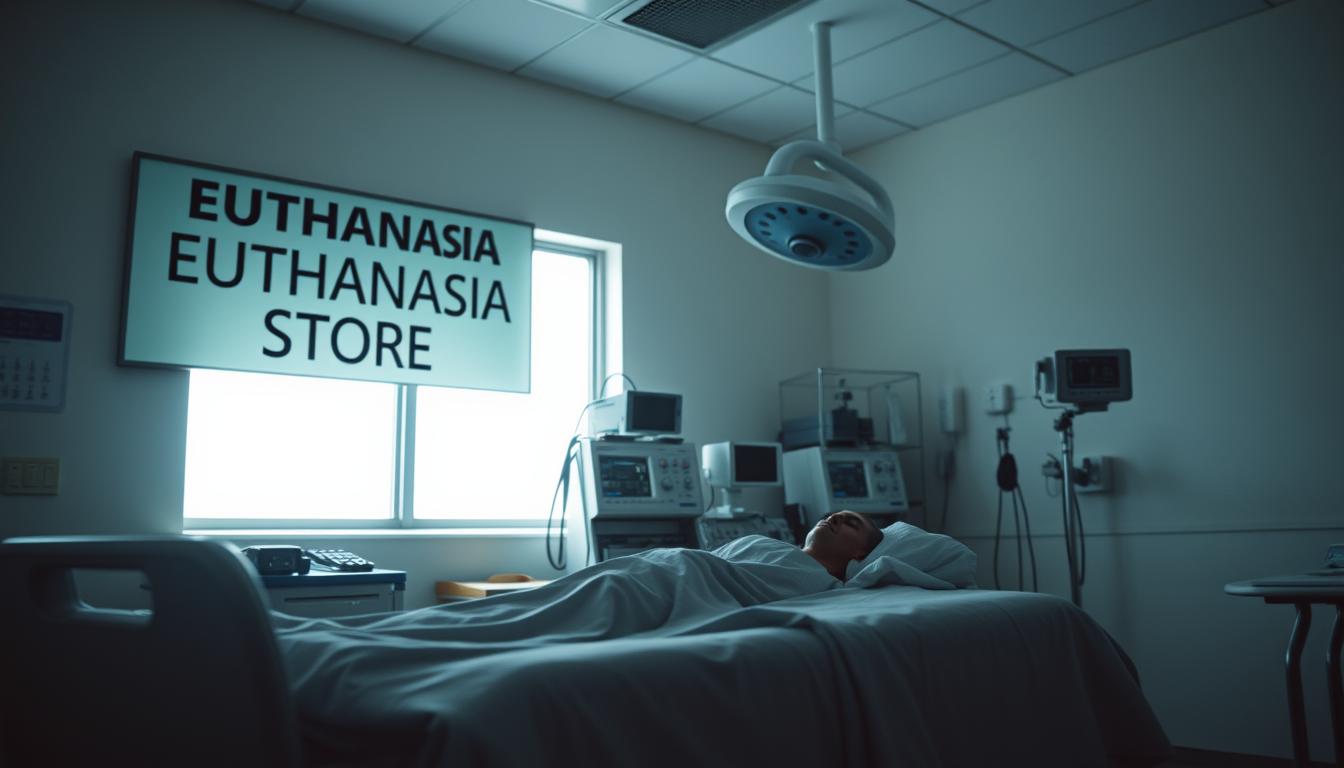In the Netherlands euthanasia a controversial topic. Thousands of people choose to euthanasia to end their lives with dignity. Euthanasia Netherlands

The euthanasia legislation in the Netherlands is unique. It gives patients the opportunity, under certain conditions euthanasia ask.
But how does this legal euthanasia in the Netherlands exactly?
Key Points
- Euthanasia is legal in the Netherlands under certain conditions.
- Patients must make a voluntary and informed request.
- The physician plays a crucial role in the euthanasia process.
- The euthanasia procedure is strictly regulated.
- Patients are entitled to a second opinion.
What is euthanasia?
Euthanasia is a difficult and sensitive subject. It raises questions about people's lives and freedom. We will explore what euthanasia is, its different forms and how it differs from palliative care. Euthanasia Netherlands
Definition and forms of euthanasia
Euthanasia means the intentional cessation of a person's life at their request. There are two main forms: active euthanasia and passive euthanasia. Active euthanasia means giving a lethal substance. Passive euthanasia involves stopping treatments that prolong life.
| Form of Euthanasia | Description |
|---|---|
| Active Euthanasia | Administration of a lethal substance |
| Passive Euthanasia | Discontinuation of life-extending treatments |
The difference between euthanasia and palliative care
Palliative care helps people with serious illnesses live better lives. The goal is not to end life. Euthanasia is specifically designed to stop life.
Self-determination and dying with dignity
Self-determination and die with dignity are important in the euthanasia debate. It is about people's right to choose for themselves when they want to stop living. This must be done with respect for their dignity.
We want this information to help people better understand what euthanasia is. We also want to highlight its ethical and moral sides.
The history of euthanasia in the Netherlands
The history of euthanasia in the Netherlands is complex and sensitive. It is a topic that has generated discussion for many years. Much has changed in recent decades. Euthanasia Netherlands
Legislative development
The development of euthanasia laws began in the 1970s. In 1984 came the first euthanasia law. But it wasn't until 2002 that the current law, the Life Termination Review Act on request and assisted suicide, in effect.
| Year | Event |
|---|---|
| 1973 | First euthanasia case comes to court |
| 1984 | First euthanasia bill passes |
| 2002 | Current euthanasia law takes effect |
Important court cases and precedents
There have been many court cases that have affected euthanasia. One well-known case is the Postma case in 1973. In it, a doctor was prosecuted for euthanasia on his mother. Euthanasia Netherlands
Social acceptance
Acceptance of euthanasia in the Netherlands has increased. Surveys show that many people accept euthanasia. They see it as an option for people with unbearable suffering.

Current legislation surrounding euthanasia in the Netherlands
The Dutch law on euthanasia was established in 2002. This law establishes the rules for euthanasia and assisted suicide. It is the basis of Dutch euthanasia legislation. Euthanasia Netherlands
The Control of Life Termination on Request and Assisted Suicide Act
This law ensures that euthanasia and assisted suicide are done only with justification. The doctor must act with care. The patient must request euthanasia voluntarily and deliberately.
The NVVE says:
"Euthanasia is an extreme remedy. It is recommended only when the patient is suffering unbearably and without hope."
Regional Euthanasia Review Committees.
The Regional Euthanasia Review Committees. (RTE) verify that euthanasia is performed according to the law. The Netherlands has five RTEs, each serving part of the country.
| Region | Number of committee members |
|---|---|
| Regional Euthanasia Review Board North | 5 |
| Regional Euthanasia Review Board East | 5 |
| Regional Euthanasia Review Board Middle | 5 |
| Regional Euthanasia Review Board South | 5 |
| Regional Euthanasia Review Board West | 5 |
Recent legislative changes and developments
There have been several changes to euthanasia laws over the years. One recent change is the expansion of euthanasia for people with dementia. There is also discussion about "completed life" and euthanasia for the elderly. Euthanasia Netherlands

The discussion on euthanasia is always current and evolving. It is crucial that legislation be adaptable to new developments and social changes. Euthanasia Netherlands
Criteria for euthanasia in the Netherlands
Patients must meet certain criteria to receive euthanasia. These criteria ensure that euthanasia is done carefully and according to the law.
Unbearable and hopeless suffering
An important criterion is unbearable and hopeless suffering. The patient must have a severe and hopeless condition. This means that other treatments are not helping.
Voluntary and deliberate request
The request for euthanasia must be voluntarily and deliberately are. The patient must be able to decide independently, without pressure from others.

Education about alternatives
Patients receive adequate information about alternatives. This includes palliative care. That way they know all the options before they choose. Euthanasia Netherlands
Consultation of an independent physician
A independent doctor must review the decision. This physician examines the patient and confirms the euthanasia decision. This ensures that all criteria are met.
By following these criteria, euthanasia in the Netherlands is performed carefully and according to the law. The interests of the patient are central to this.
The euthanasia procedure in the Netherlands
The euthanasia procedure in the Netherlands follows a careful process. It includes several steps. It is important that all involved follow this procedure. Thus, euthanasia is performed in a legal and ethical manner. Euthanasia Netherlands

The conversation with the doctor
The process starts with a conversation between the patient and the doctor. The doctor explains what euthanasia entails and the consequences. This conversation is essential to determine if the patient meets the criteria. Euthanasia Netherlands
"Euthanasia is an extreme act of compassion, in which the physician helps the patient end their life with dignity."
- A doctor on euthanasia
The role of the SCEN physician
A SCEN physician is consulted to assess the patient's wishes. They verify that the procedure is followed correctly. The SCEN physician is crucial to the diligence of the process.
| Step | Description |
|---|---|
| 1. Conversation with the doctor | The patient discusses his wish for euthanasia with the physician. |
| 2. Consultation SCEN physician | An independent SCEN physician evaluates the patient's wishes. |
| 3. Performing euthanasia | Euthanasia is performed by the physician. |
| 4. Aftercare | The bereaved receive aftercare and support. |
| 5. Notification procedure | The doctor reports the euthanasia to the Regional Euthanasia Review Board. |
Implementation and aftercare
Euthanasia is performed in a humane manner. After the euthanasia, the next of kin receive aftercare. This helps them in their grieving process.
Reporting procedure after euthanasia
After the euthanasia, the doctor reports it to the Regional Euthanasia Review Committee. This committee checks whether the euthanasia was performed according to the rules.
The euthanasia procedure in the Netherlands ensures patient dignity and self-determination.
Living wills and euthanasia statements
A will is a document that lists your wishes for euthanasia. It ensures that your wishes are respected if you can no longer decide for yourself.
Preparing a written will
Preparing a written will is crucial. It shows clearly what you want in euthanasia. That way, your wishes are respected.
An example of a will is:
I want euthanasia to be performed if I am suffering unbearably and hopelessly.
Legal status of living wills
In the Netherlands, a will has a certain legal status. It is not mandatory, but it does help respect your wishes. Euthanasia Netherlands
| Legal status | Description |
|---|---|
| Legal recognition | A living will is not required by law, but it is recognized. |
| Legal implications | A living will can help ensure that your wishes are respected. |
Updating your will
Your living will should be updated regularly. That way, your wishes will remain respected.
Saving and communicating your wishes
Keeping your will in a safe place is essential. It is also important to share your wishes with your loved ones and doctor.

Special situations at Euthanasia Netherlands
Euthanasia Netherlands encounter complex situations. Consider dementia and psychiatric conditions. These require a careful approach.
Euthanasia in dementia
Euthanasia in dementia is very sensitive. Patients with dementia can no longer make decisions for themselves.
"The moral complexity of euthanasia in dementia lies in whether the patient is still able to make an informed decision."
Prof. Dr. G.A.M. Widdershoven, physician and ethicist
Dutch law says the doctor must check whether the patient really wants to stop living.
Euthanasia in psychiatric disorders
Euthanasia in people with psychiatric problems is also difficult. It is important for the doctor to see that the suffering is truly intolerable.
| Criterion | Description |
|---|---|
| Unbearable suffering | The patient experiences severe and unbearable suffering as a result of the psychiatric condition. |
| Pointless suffering | No more reasonable treatment options are available to relieve suffering. |
Euthanasia in minors
Euthanasia in minors is rare and complex. The law says that children between 12 and 18 years old, with parental consent, can request euthanasia.
Completed life issues
The discussion of "completed life" is about elderly people who see their lives as completed. They ask for euthanasia without a serious illness.
This question leads to a discussion of the limits of euthanasia in our society.
Practical aspects of euthanasia
Euthanasia in the Netherlands has more than moral and legal aspects. There are also practical issues such as costs, accessibility to doctors, and spiritual support. This applies to both the patient and their loved ones.
Fees and charges
The cost of euthanasia depends on the situation of the patient and the doctor. Usually, health insurance reimburses the cost. But it is smart to ask in advance exactly what will be reimbursed.
Accessibility and availability of physicians
It is important that physicians are willing to perform euthanasia. Although many doctors do this, there may be differences in availability by region.
Spiritual guidance and support
Spiritual guidance is crucial in euthanasia. Patients and their loved ones receive emotional support. This helps in coping with the process.
Impact on family and loved ones
The impact of euthanasia on family and loved ones is profound. It is essential that they get the support they need. This way, they can better cope with the loss.
Euthanasia in the Netherlands compared to other countries
The Netherlands looks at euthanasia differently than other countries. We will look at how the Netherlands differs from Belgium, Luxembourg, Switzerland and countries where euthanasia is not allowed.
Euthanasia laws in Belgium, Luxembourg and Switzerland
Belgium, Luxembourg and Switzerland are close to the Netherlands on euthanasia. Belgium made euthanasia legal in 2002. In 2014, it also became possible for minors. Luxembourg followed in 2009. Switzerland has its own rule, which requires the patient to take the resources himself.
Differences with countries where euthanasia is not legal
In many countries, euthanasia is not allowed or is strictly regulated. These countries often follow a different path, based on moral or religious considerations. Consider the United States, where it is legal in some states, but not everywhere.
International trends and developments
Globally, we are seeing a trend toward greater tolerance for euthanasia. Countries are increasingly considering whether to allow euthanasia. There is also more attention to the need for proper rules to prevent abuse.
The main points are:
- Euthanasia is regulated differently in different countries.
- Belgium, Luxembourg and Switzerland have liberal euthanasia laws.
- In many countries, euthanasia has not been legalized.
- There is a trend toward liberalization of euthanasia laws.
Conclusion euthanasia in the Netherlands
Euthanasia is a complex and sensitive issue in the Netherlands. It has a long history and unique legislation. In this article, we have discussed the different aspects of euthanasia in the Netherlands.
The Life Termination Review Act on request and assisted suicide forms the basis for euthanasia in the Netherlands. The criteria for euthanasia are clear. This ensures that the decision to euthanasia is made carefully.
The future of euthanasia in the Netherlands depends on ongoing discussion and development. The Netherlands has a unique and constantly evolving approach.
In summary, euthanasia in the Netherlands is a complex and multifaceted issue. It requires constant attention and careful consideration. The future of euthanasia will be determined by the ongoing discussion and development of legislation and practice.
FAQ
What exactly is euthanasia?
Euthanasia means the intentional termination of a person's life. This is done at their express request. The goal is to stop their excruciating pain.
What are the criteria for euthanasia in the Netherlands?
In the Netherlands, you must meet certain criteria for euthanasia. You must unbearable suffering have and a voluntary request do. You should also be well informed about alternatives. Finally, an independent doctor should give you advice.
How does the euthanasia procedure work in the Netherlands?
The procedure in the Netherlands begins with an interview with the doctor. After that, the SCEN doctor plays an important role. Then euthanasia is performed and comes aftercare. Finally, one reports it to the government.
What is the difference between euthanasia and palliative care?
Euthanasia means intentionally ending life. Palliative care attempts to relieve symptoms. The goal is to improve the quality of life in serious illnesses.
Can I make a living will for euthanasia?
Yes, you can make a living will. This makes your wishes regarding euthanasia clear. It is important to update it regularly.
What about euthanasia in dementia?
Euthanasia in dementia is possible. But the process is complex. It requires careful consideration by both the patient and the physician.
What are the costs and fees for euthanasia?
The cost of euthanasia is reimbursed by health insurance companies in the Netherlands. However, it is important to check in advance exactly what will be reimbursed.
How can I get spiritual guidance and support for euthanasia?
There are several organizations and professionals who can help you. Consider pastors, spiritual caregivers and patient associations.
How is euthanasia in the Netherlands compared to other countries?
The Netherlands has unique euthanasia laws. This differs from other countries. Belgium, Luxembourg and Switzerland also have their own rules and practices.
What is the role of the Regional Euthanasia Review Boards?
The Regional Euthanasia Review Committees. check whether euthanasia was performed according to the rules. They assess whether the criteria have been met.



